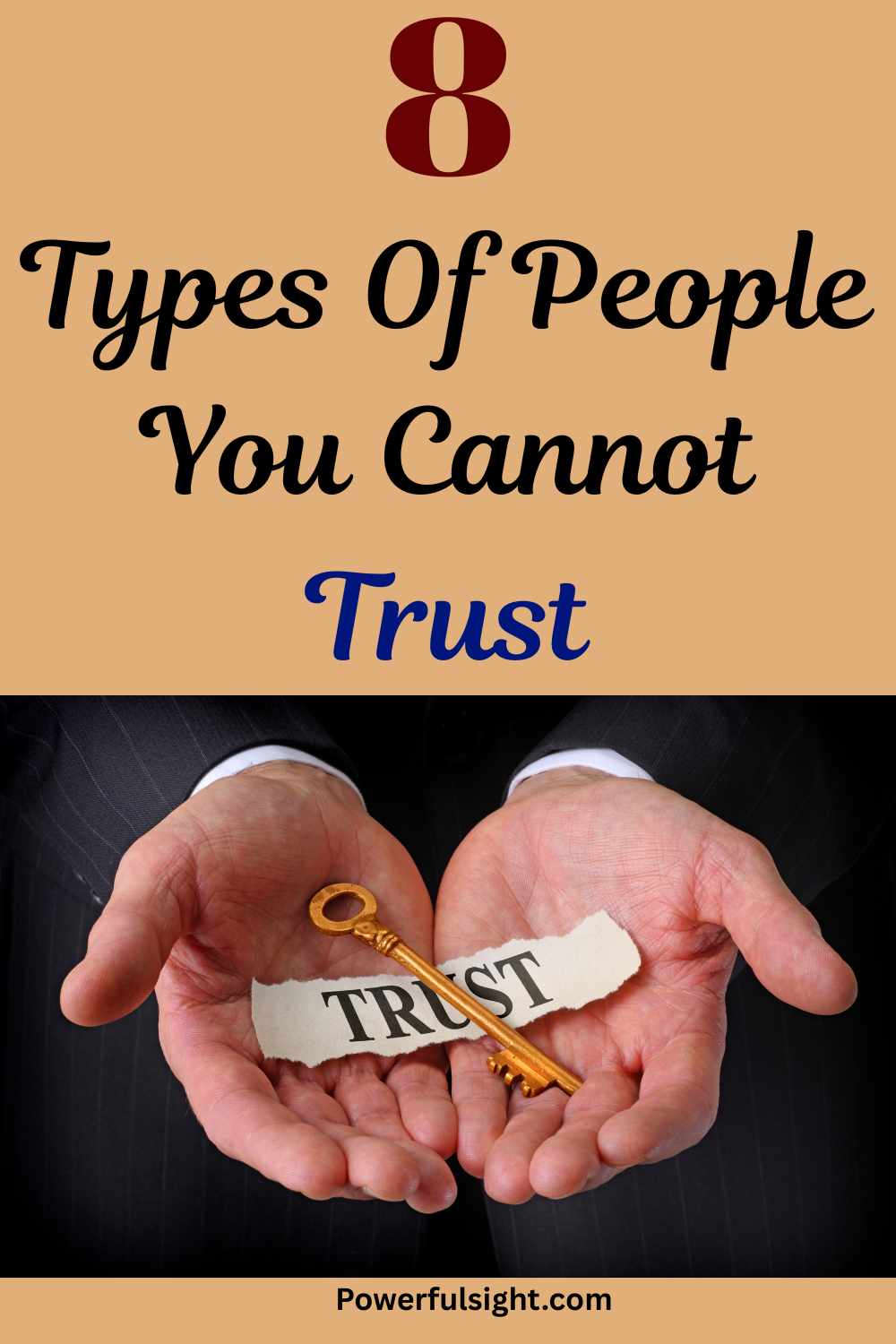Trust is crucial for healthy relationships. It creates a sense of security and helps build respect and open communication. However, not everyone deserves your trust.
Some people exhibit behaviors that make them manipulative, disloyal, or unreliable. It’s essential to identify them before they can hurt you physically or emotionally.
Here are eight types of people you should be wary of, as they tend to display characteristics or behaviors that make them untrustworthy.

8 Types Of People You Cannot Trust
1. The Chronic Liar
A chronic liar is someone who habitually tells falsehoods. Lying becomes second nature to them, not only for a particular purpose or when the truth is uncomfortable.
Their lies can range from trivial, unimportant things to fabricated stories about their personal life. Sometimes, they may not even realize they are lying because it has become such a frequent habit.
How to spot them:
-
They tell stories that have many inconsistencies or change slightly when asked for more details.
-
Their stories often contradict each other or require them to “cover up” past lies with new ones.
-
They may become defensive when confronted or questioned about what they have said.
Why they can’t be trusted:
Trusting a chronic liar means second-guessing almost everything they say. If they lie about insignificant things, it’s only a matter of time before they lie about something more important, leaving you in a state of uncertainty and suspicion.
What to do:
Emotionally distance yourself from them and confront them about their lies. If you cannot trust them, it is not wise to maintain a relationship, as continual lying will only further deteriorate trust.
Related: 30 Things Cheaters Always Lie About
2. The Manipulator
Manipulators use their power or influence to get what they want, often at the expense of others. They can appear charming and may play the victim or act empathetic, but their focus is usually on themselves.
How to spot them:
-
They make you feel guilty or responsible for their feelings or actions, even if you haven’t done anything wrong.
-
They twist the truth to confuse or guilt you.
-
They use guilt trips to get you to do things that primarily benefit them, while making it seem like it’s for your own good.
Why they can’t be trusted:
Manipulators prioritize their own wants over your happiness, well-being, or feelings.
What to do:
Trust your instincts. If someone makes you feel emotionally drained, guilty, or used, distance yourself from them. Set clear boundaries and call out manipulative behavior to protect yourself.
Related: How To Respond To Narcissistic Manipulation
3. The Gossip
Gossipers share personal information about others, making them untrustworthy. If they gossip about others, they’re likely to gossip about you too.
How to spot them:
-
They know everyone’s business and share personal information about others.
-
They talk about people who aren’t present to defend themselves.
-
They ask invasive questions to gather information for gossip.
Why they can’t be trusted:
Gossipers betray others’ trust and may do the same to you if given the chance.
What to do:
Politely but firmly let them know you’re uncomfortable discussing others’ private business. Be cautious about what you share.
Related: How To Stop Wasting Your Life
4. The Narcissist
Narcissists focus on themselves, crave admiration, and lack empathy. They often manipulate situations and people to get what they want.
How to spot them:
-
They always want to be the center of attention.
-
They are oblivious to others’ needs or feelings.
-
They are overly sensitive to criticism and often blame others.
Why they can’t be trusted:
They see relationships as transactional and may betray people they care about easily.
What to do:
Protect yourself, set boundaries, and limit emotional investment. Consider ending the relationship if possible.
Related: How To Tell If A Narcissist Is Lying
5. The Commitment-Phobe
Commitment-phobes fear emotional vulnerability and long-term attachments. They are often unreliable in relationships.
How to spot them:
-
They avoid discussions about future plans or long-term goals.
-
They keep relationships superficial and avoid emotional investment.
-
They back out once the relationship becomes serious.
Why they can’t be trusted:
They pretend to want the same things as you but fail to follow through.
What to do:
Talk to them about your future and their reluctance. If they continue to dismiss the topic, reconsider whether they can provide the trust and support you need.
6. The Passive-Aggressive Personality
Passive-aggressive people handle their feelings indirectly, often using sarcasm, backhanded comments, the silent treatment, or simmering resentments.
How to spot them:
-
They avoid direct communication and show displeasure indirectly.
-
They agree to do something but fail to follow through or do it poorly.
-
They hold grudges and subtly communicate their displeasure.
Why they can’t be trusted:
They avoid taking ownership of their actions and often withhold information or tell half-truths.
What to do:
Call out passive-aggressive behavior and request open communication. Set strong boundaries to prevent manipulation.
7. The Drama Queen/King
Drama queens/kings create conflict and exaggerate situations to get attention. They are often untrustworthy.
How to spot them:
-
They frequently create or exaggerate conflict.
-
They distort stories to favor themselves.
-
They intentionally cause tension among others.
Why they can’t be trusted:
They manipulate and misdirect, often turning themselves into the victim and creating chaos.
What to do:
Stay neutral and limit interactions. Avoid getting involved in their drama or gossip.
8. The “One-Upper”
A “one-upper” always tries to outdo others and make their experiences or accomplishments seem greater.
How to spot them:
-
They always try to top your stories or achievements.
-
They rarely offer genuine praise or compliments.
-
They downplay your struggles to highlight their own.
Why they can’t be trusted:
Their self-centered behavior makes you feel belittled or unimportant.
What to do:
Recognize their pattern and steer conversations away from competitive comparisons. Avoid sharing personal information they can use to one-up you.
Final thought
Trust is a currency in life, not all deserve it. There are people who play the system and the game for their advantage; those who cannot go a day without lying; people that never really look beyond their own nose.
Be selective, be wise with your trust. Fill your world with those you can trust and build solid relationships that are genuine and full of respect.
Know the kind of people that break trust. They will take you through heartache and suffering, leave you bitter, angry and alone.
Save the pin for later

- 9 Things Daughters Of Narcissistic Mothers Don’t Do - 02/03/2026
- Daughters of Narcissistic Mothers Healing Affirmations - 27/02/2026
- 5 Perfect Mother’s Day Gift Ideas (That She’ll Truly Love) - 27/02/2026
